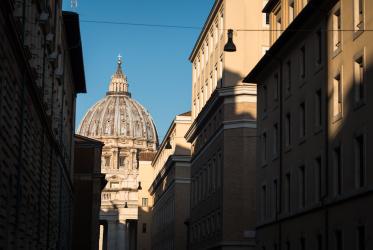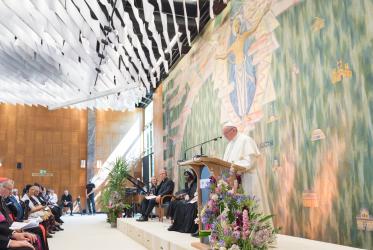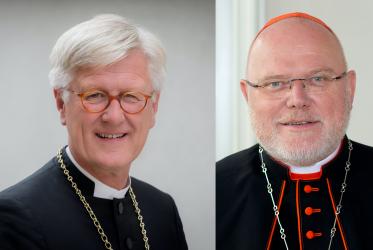Lariano/Velletri (Italy) : May 12-16, 2006
Organised by the Pontifical Council for Interreligious Dialogue, Vatican City, and the Office on Interreligious Relations & Dialogue of the World Council of Churches, Geneva
Introduction
We, the participants in the inter-faith reflection on "Conversion: Assessing the Reality", met at Lariano (Italy) on May 12-16, 2006. We, 27 of us, belong to Buddhism, Christianity, Hinduism, Islam, Judaism and Yoruba religion. We shared our views and experiences on this important subject over five days of co-living in the peaceful, idyllic and spiritually vibrant surroundings of Villa Mater Dei - a kind of inter-faith pilgrimage, brief but fulfilling. Our deliberations were intense, and took place in an atmosphere of cordiality, mutual respect and commitment to learn from one another's spiritual heritage, which together constitute the common inheritance of the entire humankind.
We affirm our commitment to the process of inter-religious dialogue. Its necessity and usefulness have increased exponentially in our times for promoting peace, harmony and conflict-transformation - within and among nations in our speedily globalizing world --, especially since religion has often been used, rather misused, to shed blood, spread bigotry and defend divisive and discriminatory socio-political practices.
We hold that inter-religious dialogue, to be meaningful, should not exclude any topic, however controversial or sensitive, if that topic is a matter of concern for humankind as a whole or for any section/s thereof.
It is our conviction that honest and candid dialogue can enlighten and deepen our understanding even on the most contentious of issues. The clarification and, hopefully, resultant reduction in the areas of disagreement and ignorance can help communities to expand the possibilities for reconciliation and living together in peace, love and amity, according to our respective religious precepts.
Therefore, we wholeheartedly welcome the initiative taken by the Pontifical Council for Inter-Religious Dialogue, Vatican City, and the Office on Interreligious Relations & Dialogue of the World Council of Churches, Geneva, for organizing this consultation on an issue that is rarely a subject of inter-faith dialogue. We convey our sincere thanks to them. Our own comprehensive deliberations over the past five days on religious conversion - in its theological as well historical and contemporary contexts - have testified to the value and usefulness of sharing our reflections on an issue which is often the cause of misunderstanding and tension among communities in many parts of the world.
Many differences and disagreements among the participants remained at the end of the consultation. Indeed, there was no unanimity even on the meaning of "conversion". Nevertheless, we wish to record that our deliberations helped us develop a convergent understanding of the several aspects of the issue of religious conversion, making us more sensitive to each other's concerns, and thus strengthening our understanding that such concerns need to be addressed through appropriate action locally, nationally and internationally.
A summary of reflections and recommendations
This document summarizes the main points of view expressed by the participants. It also records some consensual recommendations for the consideration of our respective communities, and of the countries and organizations to which we belong.
-
All of us believe that religions should be a source of uniting and ennobling of humans. Religion, understood and practiced in the light of the core principles and ideals of each of our faiths, can be a reliable guide to meeting the many challenges before humankind.
-
Freedom of religion is a fundamental, inviolable and non-negotiable right of every human being in every country in the world. Freedom of religion connotes the freedom, without any obstruction, to practice one's own faith, freedom to propagate the teachings of one's faith to people of one's own and other faiths, and also the freedom to embrace another faith out of one's own free choice.
-
We affirm that while everyone has a right to invite others to an understanding of their faith, it should not be exercised by violating other's rights and religious sensibilities. At the same time, all should heal themselves from the obsession of converting others.
-
Freedom of religion enjoins upon all of us the equally non-negotiable responsibility to respect faiths other than our own, and never to denigrate, vilify or misrepresent them for the purpose of affirming superiority of our faith.
-
We acknowledge that errors have been perpetrated and injustice committed by the adherents of every faith. Therefore, it is incumbent on every community to conduct honest self-critical examination of its historical conduct as well as its doctrinal/theological precepts. Such self-criticism and repentance should lead to necessary reforms inter alia on the issue of conversion.
-
A particular reform that we would commend to practitioners and establishments of all faiths is to ensure that conversion by "unethical" means are discouraged and rejected by one and all. There should be transparency in the practice of inviting others to one's faith.
-
While deeply appreciating humanitarian work by faith communities, we feel that it should be conducted without any ulterior motives. In the area of humanitarian service in times of need, what we can do together, we should not do separately.
-
No faith organization should take advantage of vulnerable sections of society, such as children and the disabled.
-
During our dialogue, we recognized the need to be sensitive to the religious language and theological concepts in different faiths. Members of each faith should listen to how people of other faiths perceive them. This is necessary to remove and avoid misunderstandings, and to promote better appreciation of each other's faiths.
-
We see the need for and usefulness of a continuing exercise to collectively evolve a "code of conduct" on conversion, which all faiths should follow. We therefore feel that inter-religious dialogues on the issue of conversion should continue at various levels.



